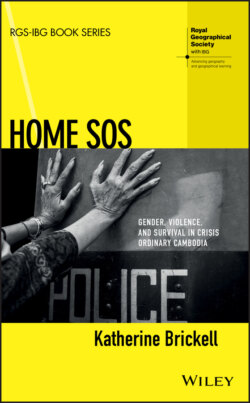Читать книгу Home SOS - Katherine Brickell - Страница 25
Conclusion
ОглавлениеIn this conceptually led chapter, I have explored ideas of crisis ordinary and survival‐work, bio‐necropolitics and precarity, intimate war and slow violence, law and lawfare, and rights to dwell. It has encouraged scholastic conversations across these multiple theoretical arenas and has drawn attention to the need for crisis and the capacity to dwell to be interrogated through different theories of violence, precarity, and demise. With the exceptions of precarity and intimate war, these conceptual ideas have not originated from feminist work, but have increasingly been the subject of feminist substantiation as well as critique. Home SOS continues, and extends, this work through its focus on domestic violence and forced eviction as embodied entanglements with patriarchal and capitalist forces. Both are forms of gender‐based violence that are articulated in, but also promulgated from outside, the extra‐domestic home.
They are also everyday encounters, which for many women in Cambodia are a chronic part of ordinary life. These encounters amass through increments and take an especially acute toll on women and the intensity of survival‐work necessitated. The temporal chronicity of crisis inherent in domestic violence and forced eviction is why conceptual notions such as the crisis ordinary and slow violence hold such potential purchase in the study of gender‐based violence. Through these complementary conceptual ideas and the integrated study of domestic violence and forced eviction, the rest of the book aims to examine these intimate geographies of violence and the ever‐dynamic relationship between gender, space, and power in twenty‐first century Cambodia. The contextual scene is set up next in Chapter 3, which provides the backdrop in which these domestic crises are produced and reproduced in time and space.
